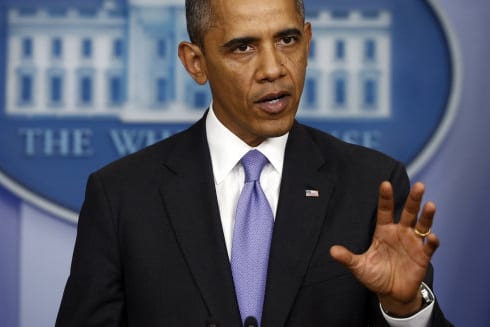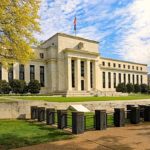Federal Government Reopens, Cloud of Uncertainty Passes for Now
The cloud of financial ruin threatening the U.S. and world economy floated away Wednesday, but it will be back.
President Barack Obama and Congress made sure of that when they approved a measure to raise the debt limit and reopen the federal government, but put a time limit on both.
The debt ceiling, which allows the U.S. to borrow money by issuing Treasury bonds, will be raised through Feb. 7, 2014. The money borrowed between now and then will help fund government agencies at their current levels through Jan. 15 when the whole mess will be revived in Congress for the fourth time since budget battles and raising the debt ceiling were joined together in the summer of 2011.
The most recent measure calls for a congressional conference committee to come up with a long-term fiscal solution for the stalemate between deeply divided Democrats and Republicans. Three temporary compromises have been reached in the past 24 months and each one has called for joint committees to find a permanent solution.
None has been found and there is little optimism that the new committee, headed by Rep. Paul Ryan, R-Wis. and Sen. Patty Murray, D-Wash., will have one before Jan. 15.
“We’ve got to get out of the habit of governing by crisis,” Obama said at a press conference Wednesday. “We could get all these things done, even this year, if everybody comes together in a spirit of ‘How are we going to move this country forward?'”
Sen. Mitch McConnell, R-Ky. said in a press release that “this is far less than many of us had hoped for, but it’s far better than what some had sought.”
“This deal is yet another promise to work on the problem tomorrow,” Sen. Mike Enzi, R-Wyo. said in a statement.
Failure to Reach Agreements
While Wall Street rejoiced – stocks gained ground on all three major indexes – the rest of America could only sigh heavily at the continuing game of “kick the problem down the road” between Democrats and Republicans.
The two sides have been unable to agree on a compromise solution that addresses the Democrats’ desire to raise the government’s spending limit with the Republicans’ desire to curb federal spending.
The agreement Wednesday temporarily calmed worldwide fears that the U.S. government would default on its debt obligations, which are many.
If the debt ceiling had not been raised, economists were predicting global panic that would have affected virtually every aspect of the American economy in some way. Some of the crises temporarily averted were:
- The U.S. government’s inability to meet looming obligations. The Treasury Department has $363 billion in payments due by Oct. 31 for bonds it issued. There is another $12 billion in Social Security payments due next week and $58 billion due in payments for Medicare, Social Security, military salaries and other expenses. It would have been like you trying to make monthly mortgage, credit card and student loan payments off what you get for unemployment.
- Decisions by the government on who to pay first with the money they did have. About half the U.S. debt is held by foreign governments, central banks and other overseas investors. Would the U.S. government pay creditors like China, which holds $1.28 trillion in U.S. debt and Japan, which holds $1.1 trillion or use the money to pay Social Security retirees and federal employees, including the military? Now, both will be paid, at least temporarily.
- Another banking failure. When Lehman Brothers defaulted on $517 billion in debt obligations in 2008, it triggered major collapses in the U.S. and worldwide banking systems. The U.S. government has $12 billion in debt obligations – 20 times what Lehman Brothers had. Those government debts will be covered, temporarily.
- Rising interest rates. Most interest rates are tied to the U.S. Treasury bill. If the government could not pay its obligations on those bills, it would cost them even more to borrow against them in the future. That means higher interest rates for mortgages, credit cards, business loans, car loans — just about anything across the board. Interest rates should remain stable, at least temporarily.
- Stock prices likely would have plummeted. The market lost almost half its value in the five months following the Lehman Brother’s default. That includes the two top losses in market history: 777 points on Sept. 29, 2008 and 733 points two weeks later. Some investment funds are barred from holding anything less than AAA debt and with rating systems ready to drop U.S. Treasury bills from their AAA rating, there would have been a huge sell off that would have had a negative effect on the market. Stocks, definitely, ignored the whole thing.
Sources:
- Rasmus, J. (2013, October 14) The Economic Consequences of a US Debt Default. Truth-out.org. Retrieved from http://truth-out.org/news/item/19405-the-economic-consequences-of-a-us-debt-default
- Onaran, Y. (2013, October 7) A U.S. Default Seen as Catastrophe Dwarfing Lehman’s Fall. Bloomberg.com. Retrieved from http://www.bloomberg.com/news/2013-10-07/a-u-s-default-seen-as-catastrophe-dwarfing-lehman-s-fall.html
- Schoen, J. (2013, October 14) Debt default damage already unfolding. CNBC.com. Retrieved from http://www.cnbc.com/id/101110571
- McConnell, M. (2013, October 16) McConnell Announces Agreement to Re-Open Government, Prevent Default. McConnell.senate.gov. Retrieved from http://www.mcconnell.senate.gov/public/index.cfm?p=PressReleases&ContentRecord_id=01070044-1bc3-4cd0-a0b8-89271864a70d
- Enzi, M. (2013, October 16) Enzi says Senate spending deal another empty promise for tomorrow. Retrieved from http://www.enzi.senate.gov/public/index.cfm/news-releases?ContentRecord_id=de1ed19f-fceb-4184-880d-28b5988b6b2b


















